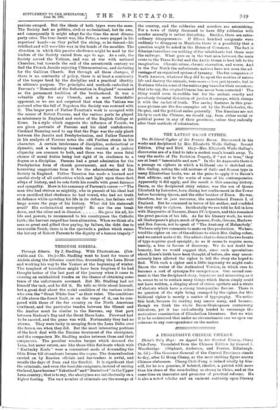THROUGH SIBERIA.
Through Siberia. By J. Stadling. With Illustrations. (Con- stable and Co. 18s.)—Mr. Stadling went to hunt for traces of Andree along the Siberian coast-line, descending the Lena River and working his way to the Yenisei at the beginning of winter. The toughest of travellers might have been forgiven if he had thought better of the last part of the journey when it came to crossing an uninhabited tundra on the chance of obtaining some trace of the unfortunate aeronaut. But Mr. Stadling had set himself the task, and he did it. He tells us little about himself, but a great deal about the social condition of the various tribes who own the "Great White San" as their ruler. The conditions of life above the forest limit, or on the verge of it, can be com- pared with those of the fur country on the North American Continent, and the particular tundra between the Olenek and the Anabar must be similar to the Barrens, say that part between Hudson's Bay and the Great Slave Lake. Firewood had to be carried, and the game was wild. Fortunately they had no storms. They were lucky in escaping from the Lena Delta over the frozen sea when they did. But the most interesting portions of the book deal with the Russian treatment of the aborigines, and the comparison Mr. Stadling makes between them and their conquerors. The peculiar wooden barges which descend the Lena, but never return, are like those Ohio flat-boats which with "Kentucky Keels" were a convenient mode of descending the Ohio River till steamboats became the vogue. The demoralisation carried on by Russian officials and far-traders is awful, and recalls the days of Ivan and the Streltzi. It is significant that the criminals, and even the bond-fide emigrants, instead of raising the level, have become" Yakutised " and " Buriatised" in the Upper Lena country; that is to say, the aborigines are intellectually on a higher footing. The vast number of criminals are the scourge of the country, and the robberies and murders are astonishing. For a town of thirty thousand to have fifty robberies with murder annually is rather disturbing. Besides, there are extra- ordinary disappearances. If fifteen hundred emigrants were suddenly to disappear in Manitoba there is a possibility that a question might be asked in the House of Commons. The fact is Siberian travellers see nothing of the inhabitants but those near the railways. What goes on in the vast area between the main route to the Trans-Bakal and the Arctic Ocean is best left to the imagination Chronic crime, chronic starvation, and worse. And in the Far North the unfortunate natives have not even the ad- vantage of an organised system of tyranny. The fur companies of North America, whatever they did to upset the routine of native life and destroy the animals, were more or less just tyrants, but in Northern Siberia some of the natives pay taxes for their ancestors; that is to say, the original Census has never been corrected ! The thing would seem incredible but for the archaic cruelty and peculiarly Oriental distortion of justice it conveys, which stamps it with the cachet of truth. The saving features in this grue- some picture are the fine examples set by the Doukhobortsi, tin Skoptsi, and the political exiles generally. The Russians are not likely to oust the Chinese, we should say, from either social or political power in any of their provinces, unless they radically alter their methods of colonisation.




















































 Previous page
Previous page